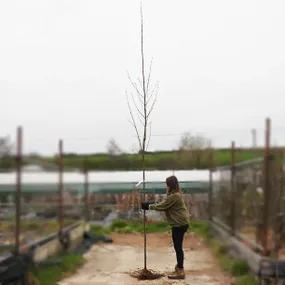Celebration Maple, Large Trees
Honest Delivery Prices- American. Male hybrid Red & Silver maple.
- Very tidy, upright tree. Good autumn colour.
- Max. Height: 15m
- Bareroot Delivery: Nov-Mar.
Recommended extras
Description
Acer x freemanii Celebration / Celzam: Bareroot Freeman's Maple Trees in Standard Sizes
Acer x freemanii Celebration has a fairly narrow, upright, pyramidal habit, suitable for most gardens and roadside planting. It has a good autumn colour display of yellows and reds, not quite as vivid as Autumn Blaze, but it has an advantage over that variety in that it rarely requires pruning to remove weak branches.
Celebration has little red, sterile flowers appearing in April, followed by vibrant green leaves in summer. They are male clones and so do not produce seeds, which makes them even lower maintenance.
A medium-sized tree, reaching about 45 feet, 15 metres, with a canopy width of about 7 metres.
Browse our other Maple varieties, or all of our trees.
Delivery season: Maple trees are delivered bareroot during late autumn and winter, approximately November-March inclusive.
Choosing a size: Small trees are cheaper, easier to handle and more forgiving of less than ideal aftercare, so they are best for a big planting project. If instant impact is your priority, or if you are only buying a few plants for use in a place where it is convenient to water them well in their first year, then you may as well use bigger ones. All our bareroot trees are measured by their height in centimetres above the ground (the roots aren't measured).
Features:
- Height: 15-20m
- Soil: Any well drained except shallow chalk
- Good yellow and red Autumn colour
- Drought tolerant
- No seeds to sweep up
- Bareroot delivery only: November-March
Growing Celebration Maples
Suitable for most soils except shallow chalk (unlike our native maple, which loves it). It is hardy, and drought tolerant when established. It will have the best autumn colour in a sunny position (acidic soil also helps), but tolerates partial shade well.
Pruning these trees to remove branches with narrow crotch angles (strong branches have wide angles, i.e. they are quite horizontal where they leave the trunk) is rarely necessary. The branches are well-formed and not likely to break under pressure from strong wind or loads of snow, which makes them well suited for exposed positions.
With young trees, all you need to do is to maintain a single leading stem and prevent a double leader from forming, but this is uncommon.
Planting Instructions
Notes on planting Celebration Maple trees:
They have no problem with pollution from cars or compacted urban soil. They are happy in any fertile soil and are suitable for damp ground that is prone to temporary waterlogging. They will grow on chalk, but we don't recommend them for this because it will affect their autumn colour. Suitable for partial shade.
Prepare your site before planting:
It is good to dig over the site where you plant a tree several months in advance. Kill the weeds first: for tough weeds like nettles, brambles and ground elder, you will usually need a weed-killer to get rid of them. When you dig the soil over, remove stones and other rubbish and mix in well rotted compost or manure down to the depth of about 2 spades.
Watch our video on how to plant a tree for full instructions.
Remember to water establishing trees during dry weather for at least a year after planting.
Tree Planting accessories:
Prepare your site for planting by killing the weeds and grass.
You can buy a tree planting pack with a wooden stake & rubber tie to support the tree and a mulch mat with pegs to protect the soil around the base of your tree from weeds and drying out.
We suggest that you use mycorrhizal "friendly fungi" on the roots of all newly planted large trees: if your soil quality is poor, we strongly recommend it.
You can also improve your soil with bonemeal organic fertiliser.
Did You Know?
The Freeman maples, Acer x freemanii, are naturally occurring crosses between Red Maple and Silver Maple. The cultivated varieties are (probably) descended from trees bred and selected by Oliver M. Freeman in 1933 at the US National Arboretum in Washington DC.
Bred in 1980 by Jim Zampini (1932-2017) at Lake County Nursery, Ohio. The patent name is Celzam.
Standard trees are measured by their girth in centimetres 1 metre above ground level: their trunk's waist measurement. Unlike sapling trees and hedge plants, standards aren't measured by their height, which will vary quite a bit both between and within species.
So, a 6/8cm standard tree has a trunk with a circumference of 6-8cm and an 8/10 standard has a trunk 8-10cm around. This measurement makes no difference to the tree's final height.
On average, standard trees are 2-3.5 metres tall when they arrive, but we cannot tell you precisely how tall your trees will be before we deliver them.

 Hero Img.webp)
 Hero Img.webp)

